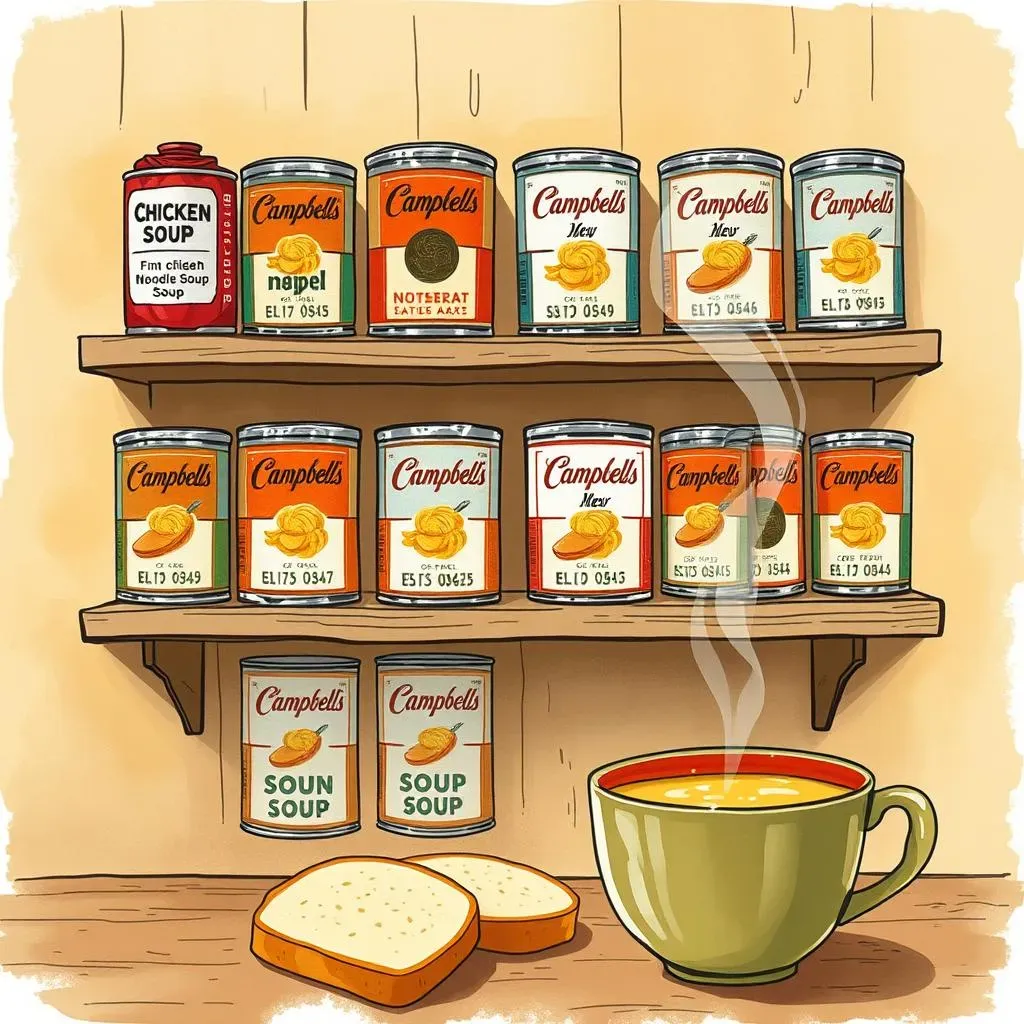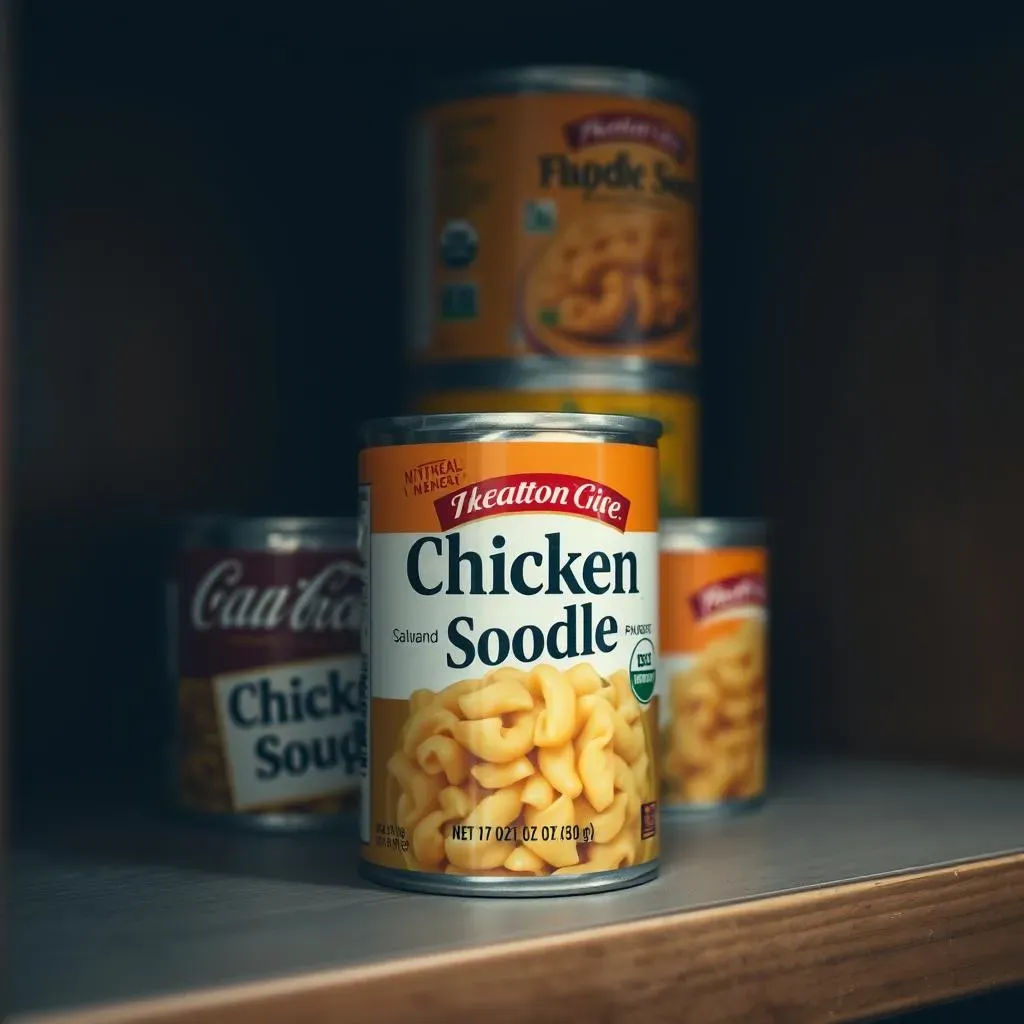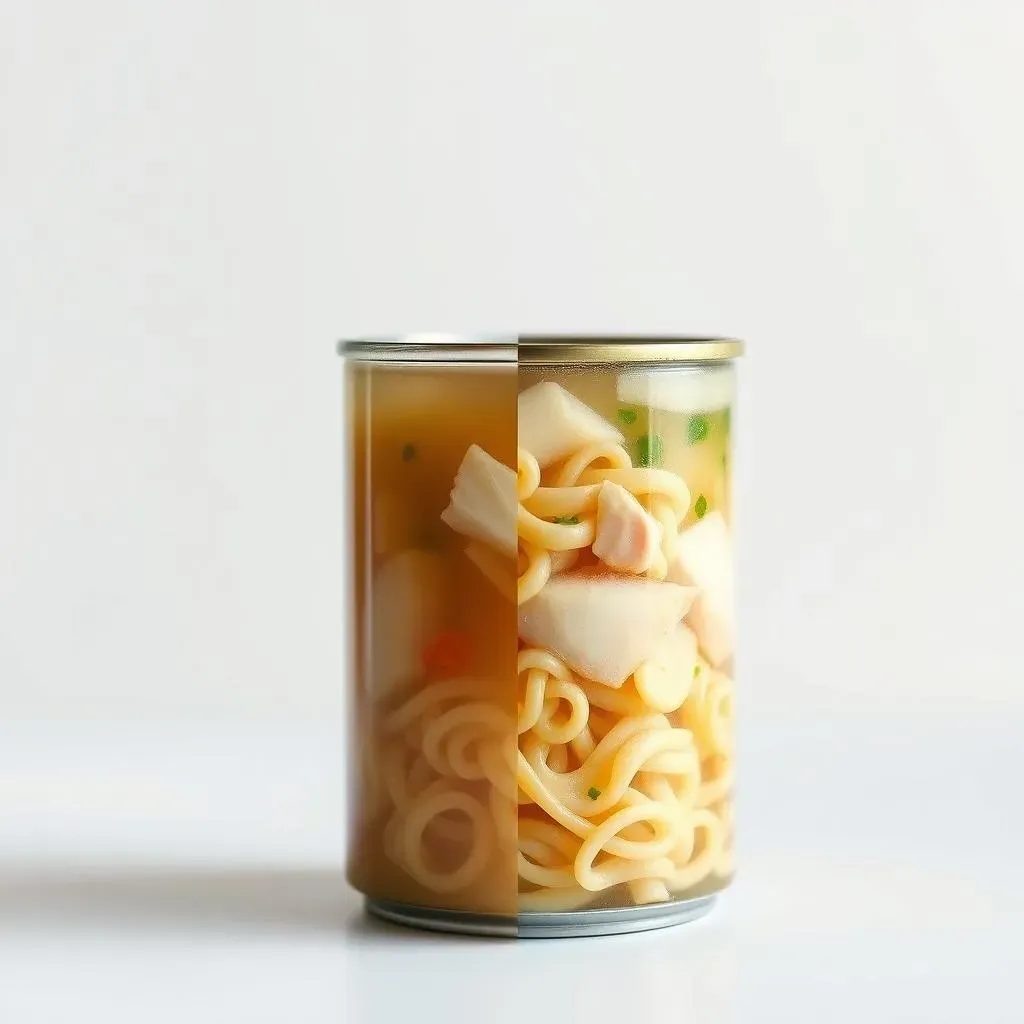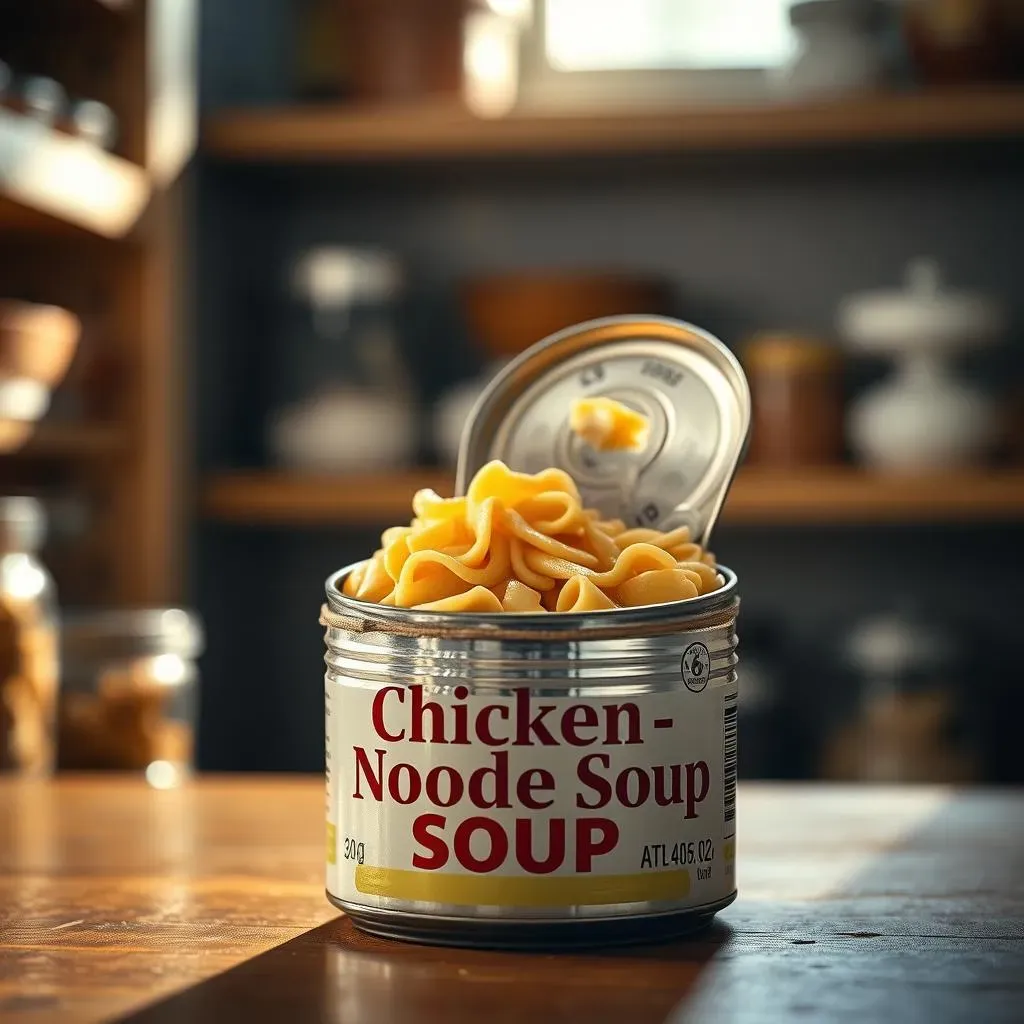Table of Contents
Ever stared into your pantry, a can of chicken noodle soup in hand, wondering, "Can chicken noodle soup go bad?" It's a question we've all pondered, especially when that "best by" date seems like a distant memory. Unlike some foods that shout their spoilage with dramatic flair, canned soup can be a bit more subtle, leading to confusion and, let's be honest, a bit of risk-taking. This article will cut through the confusion and give you the real scoop on how long that comforting can of soup can actually last. We'll explore the difference between "best by" and "unsafe," how to store your soup properly, and the telltale signs that it's time to bid that can adieu. So, get ready to become a chicken noodle soup expert – no lab coat required!
Unlocking the Mystery of Chicken Noodle Soup Shelf Life

Unlocking the Mystery of Chicken Noodle Soup Shelf Life
The "Best By" Date Deception
let's get real about those "best by" dates stamped on our beloved cans of chicken noodle soup. They're not expiration dates, despite what our panicked minds might think. Instead, they're the manufacturer's way of saying, "Hey, this is when we think the soup will taste its absolute best." Think of it like a suggestion, not a strict rule. The soup isn't going to magically transform into a biohazard the day after that date. It's more like the soup might start to lose some of its pizzazz – maybe the noodles get a bit mushier, or the broth's flavor isn't as vibrant. But safety-wise? As long as the can is intact, you're generally in the clear.
Now, if your can of soup is older than your niece, it's time to pause for a second. While commercially canned goods are designed to last a long time, the quality does degrade, and that's the key here. We're talking about flavor and texture, not necessarily safety. So, if you're looking for a gourmet experience, maybe that soup from 2018 isn't the best option. However, if you’re just trying to get some food in your belly and the can looks okay, well, it’s probably okay. It’s a bit like finding an old t-shirt in your closet. It might not be your favorite anymore, but it's still a t-shirt.
The Canned Soup Time Capsule
So, how long can we really expect our canned chicken noodle soup to hang around? Generally, we're talking about a good 3 to 5 years if it’s stored properly. Yes, you read that right, years! That’s thanks to the canning process, which is pretty effective at keeping the bad stuff out. The key is to keep that soup in a cool, dry place. Think of your pantry as a little time capsule, protecting your soup from the elements. Heat and humidity are the enemies of canned goods, so avoid storing them above the stove or near a steamy dishwasher. A dark, cool cupboard is their happy place.
But here's the catch, and it's a big one: this timeline only applies to unopened, undamaged cans. A dented can? A rusty lid? These are red flags, my friend. They mean the seal might be compromised, and that's a party no one wants to attend. It's like inviting uninvited guests to a party, and they're not bringing cake. So before you crack open that can, give it a thorough check-up. You're looking for any signs of trouble. If you see any, it's better to be safe than sorry and toss it out.
Soup Storage Factor | Ideal Condition | Avoid |
|---|---|---|
Temperature | Cool (room temp or below) | Heat (above 75°F) |
Humidity | Dry | Damp or humid areas |
Light | Dark | Direct sunlight |
Can Chicken Noodle Soup Go Bad? Storage and Safety Tips

Can Chicken Noodle Soup Go Bad? Storage and Safety Tips
The Cool, Dry Sanctuary
so we've established that chicken noodle soup can last for a surprisingly long time, but only if we treat it right. Think of your pantry as a spa for canned goods; you want it to be cool, dry, and away from any harsh conditions. This isn't just some random suggestion, it's science! Heat and moisture are like kryptonite to canned goods. They can cause the can to corrode, the seal to weaken, and potentially lead to some nasty stuff growing inside. Imagine your can of soup sweating – not a pretty picture, right? So, avoid those spots near the oven, the sink, or any place that gets steamy. A dark, cool cupboard is the best spot. Pretend you're putting your soup into a little bunker, safe from the elements.
Another thing to consider is the stacking situation. You don't want to create a leaning tower of soup cans, especially the ones on the bottom. The weight can put pressure on the seals, which can, over time, cause them to fail, and that's not what we want. Also, be gentle with your cans when you're moving them around. Treat them like fragile eggs, not like bowling balls. A little care goes a long way in ensuring your soup stays happy and safe until you're ready to enjoy it.
Decoding the Can: Dents, Rust, and Bulges
Now, let's talk about the can itself. It's not just a metal container; it's the guardian of your soup. So, before you even think about opening it, give it a good once-over. We're looking for any signs of trouble. Dents are usually okay, but if they're severe, like a major crease or a bulge, that's a red flag. A bulge means that there’s gas inside, and that is usually a sign of spoilage. Rust is another no-no. A little bit of rust on the outside of the can is okay, but any rust on the seams or lid is a sign that the integrity of the can is compromised. And if you have a can that's leaking or has a sticky residue, toss it out ASAP. It's like a warning sign saying, "Danger! Do not eat!".
It's kind of like checking a car before a road trip. You wouldn't just jump in and drive without looking at the tires, right? The same goes for canned soup. A quick inspection can save you from a potentially unpleasant experience. Remember, we're not trying to be overly cautious here; we're just being smart. If you're ever in doubt, it's always better to be safe than sorry. The cost of tossing a questionable can of soup is way less than dealing with food poisoning. Trust your instincts, and if something seems off, it probably is.
Can Condition | Safety Status | Action |
|---|---|---|
Minor dent | Generally safe | Inspect thoroughly, use soon |
Severe dent or bulge | Potentially unsafe | Discard immediately |
Rust on seams or lid | Unsafe | Discard immediately |
Leaking or sticky residue | Unsafe | Discard immediately |
Spotting Spoilage: When to Toss That Chicken Noodle Soup

Spotting Spoilage: When to Toss That Chicken Noodle Soup
The Sniff Test and Visual Clues
so you've got a can of chicken noodle soup that's been chilling in your pantry for a while, and you're wondering if it's still good to go. The first line of defense? Your senses. Give that can a good sniff when you open it. Does it smell like chicken noodle soup, or does it smell like something you'd rather not encounter? An off odor is a major red flag, like if it smells sour, musty, or just plain weird. Trust your nose, it’s usually a good indicator. Also, take a look at the soup itself. Is the color off? Does it look cloudy or discolored? Any visible mold or other unidentifiable floaties? These are all signs that your soup has taken a turn for the worse. Remember, we're aiming for appetizing, not alarming.
Sometimes, though, the signs are less obvious. Maybe the smell isn't terrible, but it's not quite right. Or maybe the color is a little duller than you remember. In those cases, it's time to be extra cautious. If you have any doubt, it's always best to err on the side of safety. It's like that old saying, "When in doubt, throw it out." The risk of food poisoning just isn't worth it. And let's be honest, there are plenty of other cans of soup in the world. So, if your senses are sending you mixed signals, it's probably best to say goodbye to that particular can.
Spoilage Sign | Description | Action |
|---|---|---|
Off Odor | Sour, musty, or unusual smell | Discard immediately |
Discoloration | Cloudy, dull, or unusual color | Discard immediately |
Visible Mold | Any signs of mold growth | Discard immediately |
Strange Texture | Slimy or unusual consistency | Discard immediately |
The Taste Test: A Last Resort
Alright, so your soup has passed the sniff and visual tests, but you're still not entirely sure. Now comes the final, and often most nerve-wracking, test: the taste test. But before you grab a spoonful, let's be clear: this is a last resort, not a go-to strategy. If you have any serious doubts, skip this step. But if you're feeling brave (or just really hungry), take a tiny taste. We're talking a small amount, like a drop on your tongue. Does it taste like chicken noodle soup? Or does it have an off, sour, or metallic taste? If it's the latter, it's a definite no-go. Spit it out and toss the can. We're not trying to win any bravery awards here.
Even if the soup tastes okay, but it doesn't taste *great*, it's a sign that the quality has diminished. It might not be unsafe, but the flavor and texture might have suffered over time. So, while it might be technically edible, it's probably not going to be the most enjoyable eating experience. It’s like that old pair of shoes you still wear, they might still function, but they are not the best choice. Ultimately, the goal here isn't just to avoid food poisoning, it's also to enjoy your meal. So, if your soup is anything less than appetizing, it's probably best to find a fresher option.
- Trust your senses, they are your best guides.
- When in doubt, throw it out.
- A tiny taste is okay if you are unsure.
- If it tastes off, discard the soup.
- Enjoy your meal!
The Bottom Line on Chicken Noodle Soup's Shelf Life
So, can chicken noodle soup go bad? Yes, eventually, but it's not as straightforward as a simple expiration date. Unopened cans can last for years if stored correctly, but it's the quality that takes a hit over time. Always check for damage and unusual signs before consuming. When in doubt, tossing it out is the safest bet. Now you can confidently navigate your pantry, armed with the knowledge to keep your soup experience safe and tasty.
